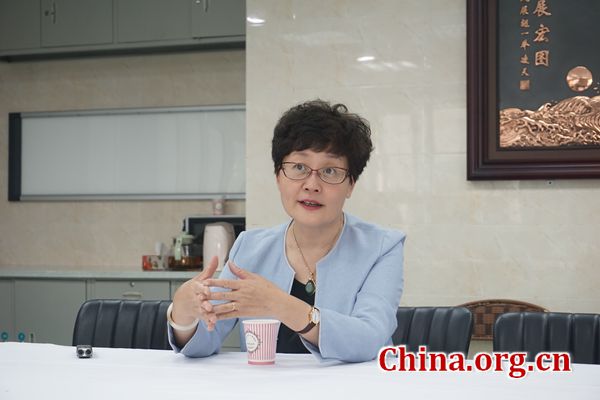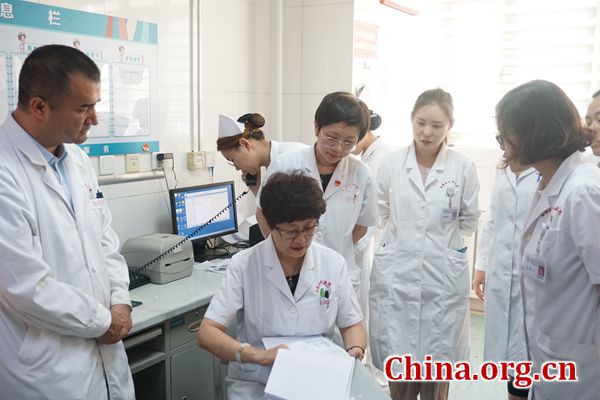Doctor fights rheumatic diseases in Xinjiang
Wu Lijun, 54, has devoted herself to the prevention and treatment of rheumatic diseases in Xinjiang over the past 30 years.
"The moment I receive a patient, tiredness fades away," said Wu Lijun, a 54-year-old doctor from the People's Hospital of Xinjiang Uygur Autonomous Region located in Urumqi.

Wu is the dean of the hospital's rheumatology & immunology department, a division consisting of medical staff of Kyrgyz, Kazak, Uygur, Hui, Tajik, Uzbek, and Han nationalities.
"We are always united as one despite ethnic diversity," Wu said, emphasizing that she couldn't achieve so much without team support.
A candidate for China's "Most Beautiful Sci-Tech Personnel" of 2019, Wu is a member of the Standing Committee of the Chinese Rheumatology Association, and vice president of the rheumatology society under the Chinese Medical Doctor Association (CMDA).
Early in her life, Wu's parents volunteered to move from central China's Henan province to work in Xinjiang. She spent her childhood in Turpan, a prefecture-level city located in the east of Xinjiang. Wu later went back to her hometown and received a bachelor's degree in medicine. Upon graduation, she chose to return to Xinjiang.
"I cherish a special feeling for Xinjiang and I can't tell why, it is right there, maybe it's because of the joy it brought to me when I was a little girl," she said.
She finally found a job in the People's Hospital of Xinjiang Uygur Autonomous Region in 1989 and has been the dean of the department of rheumatology & immunology since 2006.
Rheumatology virtually did not exist in China before 1960. The epidemiology of specific rheumatic diseases in China was not studied until 1984.
It is believed China may have 200 million patients with rheumatic diseases. Therefore, it is somewhat imperative to train more rheumatologists and physicians with a special interest in the field.
The first rheumatology & immunology laboratory in northwest China was established by Wu in Xinjiang in 1997.
During the early years of her career, she saw many patients with rheumatic diseases that were disabled due to deferred treatment. She realized that it was important to popularize related knowledge among not only common people but also the medical staff. "The disability rate will be largely reduced if the disease is timely and correctly diagnosed and properly treated," she explained.
Since 2007, Wu's team have organized more than 90 free training sessions to empower medical staff and provided free arthritis screening service for farmers and herdsmen.
In total, about a million professionals in the field have been cultivated. The disability rate caused by arthritis in Xinjiang has been lowered after years of efforts.
To share medical resources, promote development and better meet patient needs, Wu pushed for the establishment of the "Xinjiang Rheumatology & Immunology League" and the "Xinjiang League Against Arthritis".
"The people of Xinjiang are very simple and sincere. During the trips, when we were cold or hungry, they just warmly offered what they had," Wu recalled, with a flare of emotion in her voice.

According to Wu, osteoarthritis is rather common in Xinjiang compared with other inland provinces due to its natural conditions featuring aridity and large temperature variations between day and night. The morbidity of Kazak people, a nationality spending much time on horseback, is higher than that of other nationalities.
"That's why I think we have unique advantages in doing research on rheumatology and immunology, and I keep telling my team members that we have a lot of work to do and we definitely can achieve more research fruits with Xinjiang characteristics," said Wu.
She has declined invitations from several hospitals located in big cities such as Shenzhen and Qingdao. "Although my income is not as high as that of my former classmates, I won't leave, because the people here have given me too many titles, honors and respect and I need to return this," she admitted.
Her colleague Shi Yamei told reporters that Wu, suffering Meniere's disease, has never quit work before 11:00 p.m.. On her busiest days, Wu has received as many as 128 outpatients in a day. "Many of them traveled a long way to see her, and she couldn't bear to disappoint them," Shi said.
Another colleague Chen Xiaoxiao joked that Wu loves Xinjiang even more than the natives.
"Yes, I love these people very much, and my obsession with work means I have little time to take care of my family. Luckily, my family have been standing behind me all the time," Wu said.
Devoted to the prevention of returning to poverty because of disability caused by arthritis, Wu believed the next step is to strengthen chronic care management, advance international exchanges and cultivate more talents in this field.
As for Xinjiang's further development, Wu stressed that the top priority is to ensure stability and security.
"You can tell that more and more people are traveling to Xinjiang in recent years thanks to its efforts in maintaining stability," she said, adding that to attract more talents, a range of competitive welfare benefits and an inspiring academic atmosphere are absolutely necessary.

